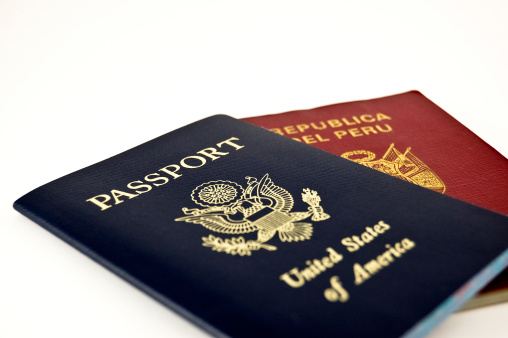US Bank Accounts for Foreign Corporations – Be Afraid…Be Very Afraid!
Not so long ago I was bemoaning how difficult it is for my American clients open offshore bank accounts and comparing that to the ease with which foreigners could open an offshore bank account in the US. Well, those glory days for non-nationals are gone…and yes, it is still very difficult and time consuming for US citizens to open offshore bank accounts.
Back in the day, which, in this context means about 6 to 12 months ago, a person living and working in Panama, with no ties to the US, could open a business bank account for their Panama corporation at Wells Fargo, Chase or Bank of America by email. They did not need to go through an extensive background check, provide reference letters, etc. All that was required was to sign the forms and provide a copy of their corporate documents and passport. The account would usually be opened in a day or two.
Now, it has become near impossible to open an offshore bank account account in the US for any type of foreign corporation. It does not matter if it is from Panama, Mexico, the UK, or wherever, you can’t open a corporate bank account in the United States without a US entity.
And it does not matter whether the owner of the offshore company is a US person or a foreigner, we are all equally suspicious under the eyes of the US government. Banks just don’t want to deal with the reporting or trying to figure out their responsibilities under the new laws…so they have shut their doors to all non-US entities.
- Of course, the rules are different for the uber rich private banking client ($5m+ accounts) and publicly traded corporations. I am referring here to average citizens and small businesses.
I first began to see this trend with my Offshore IRA LLC clients. In 2011 and through mid-2012, we had no trouble opening US brokerage accounts for Nevis and Belize LLCs that held US retirement funds. We could also go to US owned firms with offices in the UK, such as E-trade, and have an account within hours.
Now, it is impossible to open an account in the US, or at the international offices of a US company, with an offshore LLC. Even when the LLC is a properly structured and fully reporting retirement vehicle, no one is interested.
For my retirement planning clients, this means that their offshore IRA LLCs must hold their assets outside of the United States. As this is what the offshore IRA LLC does best (maximum diversification and asset protection), these limitations have not posed much of a problem.
But, what about all of the foreigners who have accounts in the US under an offshore company? There are thousands structured in this way and they are being told by their bank to switch to a US entity or get out.
Because many businesses need a US bank account for a variety of reasons, these foreigners happily pay a few hundred dollars to convert from an offshore company to a US corporation, having no idea that they have just opened in to the US tax system an turned over control of their accounts to the IRS.
In fact, the banks are telling their clients how easy it is to form these US corporations, advising them that it is the new normal, and how it will help them transact faster and with fewer questions in the US.
- I have emails to my clients from Wells Fargo advising them exactly this…go ahead, it is no big deal…it should just take a day or two!
Well, it is a very big deal. By forming a US corporation you are opting in to the US tax system. That corporation is subject to US tax on its earnings, you have created a presumption of doing business in the US, and could be opening up your other corporate structures (those outside of the US) to audit and review by the US Internal Revenue Service.
Let’s go back to my client in Panama. She wanted a US bank account to receive payments from her US customers, open a low cost credit card processing account, and use PayPal…which will not deposit in to a Panamanian bank, so a US account was required. Such a business has no ties to the US (other than the bank account) and no US source income.
When this account was under a Panama corporation, there was zero US tax reporting and zero chance of an audit. No US tax ID was required and no interaction with the IRS was expected…the IRS had no right to investigate a company with no ties to the US. Change the entity to a Delaware corporation and this relationship is completely different.
- Remember, I am talking about a Panama corporation owned by a Panamanian who is neither a US citizen nor a US resident.
Under the new structure, the US corporation is required to file a US tax return on Form 1120, net profits are assumed taxable, and the IRS can audit the return filed and require the corporation to prove whether income is US source and that deductions comply with US accounting principles. The burden of proof has shifted to the Panamanian to prove she owes no tax to the US.
With proper planning, the US corporation may not owe any taxes to the US, but their filing obligations, accounting costs, and audit risks are significant. The best case scenario is that they will spend a few thousand dollars a year on compliance. The worst case is that the IRS will seize on the opportunity to investigate all companies that look like sources of revenue and grab what they can.
Once the IRS has its nose under the foreigner’s tent, they can seize on any little discrepancy. For example, did you forget to regularly bill your US entity from your Panama corporation to ensure the US company broke-even each year? Did you travel to the US on business creating US source income? If you were in the US on vacation, can you prove no business was conducted? Did you buy real estate in the US? Can you prove it was not a rental property or used as an office? Are you ready for the IRS to contact your suppliers and business associates and start asking questions about you? Do you have proper accounting prepared for your business each year using GAAP or US tax accounting standards?
And what of those without US counsel who took the advice of their banker? They used an online incorporator, have no idea of their obligations and risks, file no US tax returns (why would they, they have no ties to the US), and then are completely screwed.
You see, after the company has been around for a few years, and no returns have been filed, the IRS will get interested. After sending a notice to the registered agent, which the owner will probably never see, they audit the company by sending a summons to the bank demanding all account statements.
The IRS will then prepare returns on behalf of the corporation, assuming all deposits are income and giving no credit for expenses. These deposits are taxed at the corporate rate of 35% and a bill is sent to the registered agent…again, the owner may never see this invoice.
Next, with no response from the owner, the debt becomes due and payable and a levy is issued to the bank requiring them to seize the funds and send them to the IRS. Keeping in mind that this bill covers ALL deposits and multiple tax years, plus ridiculous amounts of interest and penalties, you can assume that it will be quite sizable.
Now that the IRS has the owner’s money, you can believe they have his attention, but it may be too late. He has two options at this point: 1) hire a tax attorney at hundreds of dollars an hour to attempt to fix this mess, or 2) give up and let the IRS keep his money. Many people are so scared of the IRS they do just this…curse the day they listened to their banker and give up.
I will also point out that the tax attorney has a tough battle ahead of him. By not responding to the notices, the account owner may have lost his right to fight the matter in the US Tax Court, so the attorney is left to argue his case to the IRS and begging them to “do the right thing”…imagine having to explain this to the guy who just had a few hundred thousand seized by the US government. Loss of the right to tax court means the loss of legal remedies, protections from an abuse of power by the IRS, and the loss of significant leverage in negotiations.
With all of this said, a US corporation and bank account may be the best and only option for the foreigner selling products to the US, who needs a cost effective merchant account, who wants to send and receive electronic transfers rather an international wires, who needs to pay US vendors by check, or who simply need to access the US banking system for one reason or another (such as PayPal).
Just remember, once you form a US corporation, you are signing on to the US tax system and you must be ready to deal with the consequences. Make sure you have well qualified US tax and business advice before you move begin, prepare proper accounting each year, file your US tax returns, and, above all, do not take the switch from a foreign corporation to a US entity lightly.











Leave a Reply
Want to join the discussion?Feel free to contribute!